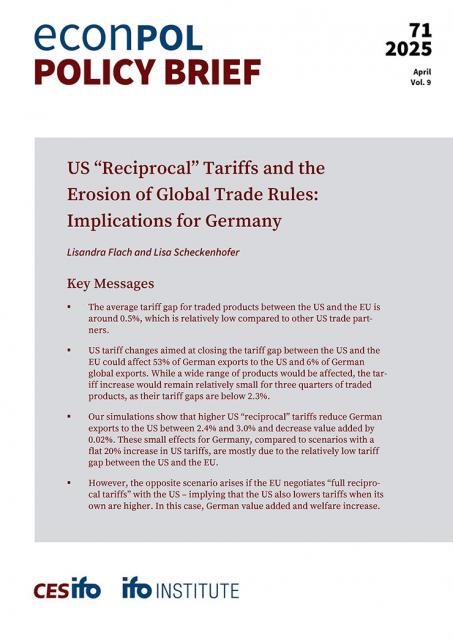News Archive

Air Pollution & Migration: Exploiting a Natural Experiment from the Czech Republic
|
Working Paper
| News
This paper from Štěpán Mikula (Masaryk University) and Mariola Pytliková (EconPol Europe, CERGE-EI) examines causal effects of air pollution on migration by exploiting a unique natural experiment of desulfurization of power plants in the region of North Bohemia in the Czech Republic after the fall of communism in 1989.

How Important are Local Knowledge Spillovers of Public R&D and What Drives Them?
|
Working Paper
| News
There is a clear consensus that stimulating firm R&D is welfare-increasing due to positive externalities and uncertainty, but the question about the most efficient way to do so is still open to debate: this paper from Leonie Koch (Ludwig Maximilian University of Munich) and Martin Simmler (EconPol Europe, Oxford University Centre for Business Taxation) analyzes the magnitude of local knowledge spillovers of public R&D in Germany and its determinants using patent application data.

Taxation of Digital Platforms
|
Working Paper
| News
An analysis of the proposals and international implications around taxing digital platforms such as Facebook and Google concludes that the European Commission’s proposed digital services tax (DST) addresses the concerns shared by policy makers: but, says author Marko Köthenbürger (EconPol Europe, ETH Zurich), there should be a more stringent definition of the digital platforms that are subjected to such a tax.

Green Government Debt for the ‘Green Deal’?
|
EconPol Opinion
| News
The ‘Green Deal’ in its objective is highly ambitious and will absorb substantive financial resources, so it is not surprising that the potential role of higher public debt is being discussed: the European Central Bank is increasingly requested to provide green finance through its asset purchase programmes and similar suggestions are being made in national debates. But does an ambitious climate policy really provide compelling arguments for higher public debt?

Sovereign Debt Crisis in Portugal and Spain
|
Working Paper
| News
In this working paper, António Afonso (EconPol Europe; ISEG – School of Economics and Management, Universidade de Lisboa; REM – Research in Economics and Mathematics, UECE) and Nuno Verdial (ISEG – School of Economics and Management, Universidade de Lisboa) analyze the events of the 2007/2008 financial crisis and European sovereign debt crisis with a focus on Portugal and Spain. They find that that the pricing of sovereign risk changed with the crisis and the “whatever it takes” speech of Mario Draghi.
